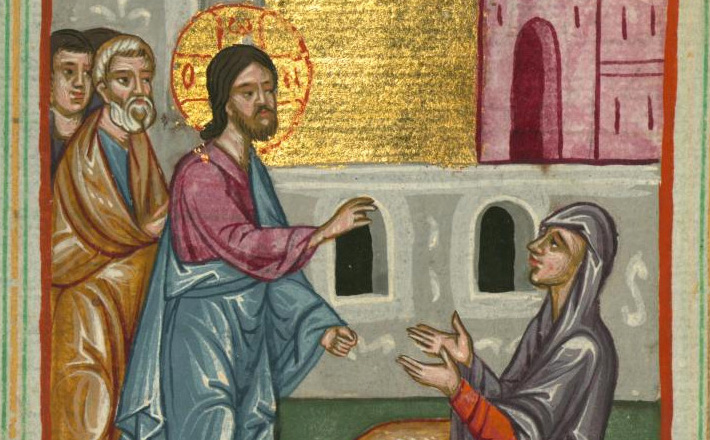Commentary on Romans 11:1-2a, 29-32
The lectionary does us no favors by splitting Romans 11 into an opening question followed by the tail end of an answer.
If this pericope is read aloud, most hearers will not know to whom “they” and “their” refer to in Romans 11:29-32. Nor should a worship leader expect hearers to be familiar with the convoluted route Paul follows in the twenty-eight omitted verses that move him from his question to his answer.
In those omitted verses, Paul starts with his own genealogy; winds through Elijah and Baal, the Exodus, prophets, and psalms. Then he turns onto a road with an overlook view of Israel’s stumbling and how that opened a door for Gentiles. That road merges into an extended metaphor of an olive tree with one root supporting both natural and grafted branches. He ends his journey with a warning to Gentile Christians not to think that because God granted them (Gentiles) salvation, God, therefore, has cut Jewish people out of salvation. In the end, God’s intent seems to be that no one is left behind.
God and the Jewish people
I’ve never taken a poll, but I imagine that many Christians would say that the answer to Paul’s question — “Has God rejected [the Jews]?” — is “Yes.” After all, they rejected Christ, blew their chance, and that’s the end of the story — otherwise, what’s the point of evangelism? Given the amount of attention Paul gives this question, apparently many Christians back then would have given the same answer. This notion dies hard.
However, Paul could not have been more emphatic about the “no-ness” of his “NO” in answering the question. The NRSV and NIV translations here, “By no means!” do not do justice to his words. They’re more like, “Absolutely NOT!” or “No WAY!” or “You’ve got to be KIDDING me!” or “REALLY? I can’t BELIEVE you actually asked that question.”
His certainty relies less on his convoluted argument and more on his baseline conviction that God can be trusted forever — “God’s gifts and call are irrevocable” (Romans 11:29). There’s no budging, no fudging, no hidden escape clauses, no backtracking, no pulling the rug out from under anyone who has ever counted on God — no matter how fleetingly or how devotedly or anything in between.
Some verses omitted from this passage reiterate that point in ways that some commentators try to soften, arguing that Paul should not be taken literally when he says: “so all Israel will be saved” (Romans 11:26), “as regards election they are beloved” (11:28), leading up to his sweeping conclusion: “God has imprisoned all in disobedience so that [God] may be merciful to all” (11:32). This conclusion is reprised and extended later, in the categorical statement that “from [God], through [God], and to [God] are all things” (11:36). Some people fidget under the prospect that in these verses “all” might mean “all.”
One cannot build a soteriology solely on Romans 11, but even if one wants to blunt its implications, these verses offer an extended celebration of a God of promise, invitation, and mercy rather than one of threat, judgment, and wrath. Romans 11’s sternest warnings are directed at Gentile Christians (i.e., us) who might think more highly of themselves than they ought to think when they consider God’s love for the world and everyone in it. Paul’s admonitions to Gentile Christians are worth heeding today: “I am speaking to you Gentiles” (11:13) … you were wild branches grafted in (11:17) … remember that it is not you that support the root, but the root that supports you (11:18) … So do not become proud but stand in awe” (11:20).
Sin and mercy, death and life
We have looked at the second part of Romans 11:32, which focuses on God’s mercy. The first part deserves attention as well. The statement that “God has imprisoned all in disobedience” represents one facet of another of Paul’s baseline convictions, harkening back to an earlier assertion that “the law of the Spirit of life in Christ Jesus has set you free from the law of sin and of death” (8:2).
Paul sees a major human predicament lying in two captivities that plague us our whole lives. He identifies one of the “sufferings of this present time” as the whole creation’s “bondage to decay” (Romans 8:18-23). The circle of life inevitably rolls through death, for all creation. Every illness, accident, or injury; every “fire or flood, storm or earthquake”; every safety warning in every owners manual for virtually every product sold in the U.S. reminds us (probably overly reminds us) that our grip on life and health can quickly become tenuous and small. Being set free from the law of death represents one of God’s great gifts.
Our other captivity lies in the fact that we are “imprisoned in disobedience” (Romans 11:32). Without shifting too far into a doctrine of utter depravity, scripture and our own experience inescapably remind us that “sin is crouching at your door; it desires to have you, but you must master it” (Genesis 4:7), and “if we say we have no sin, we deceive ourselves” (1 John 1:8). In the Lord’s Prayer, three of the four supplications concern embodying God’s will/purpose, forgiving as we have been forgiven, and being delivered from temptation (Matthew 6:9-13). Our own imprisonment in disobedience means that, although we admire, say, the Apostle Peter’s achievements, we identify more easily with the times he fell short.
Regardless of the complexities of understanding the presence in creation of sin and death, Paul joins the consistent testimony of scripture with respect to both of them. We do not live in an amoral, purposeless universe set into motion by a neutral God who idly watches to see what happens. We do not live our lives before a God who from our birth is an angry opponent offering us a limited time opportunity to make the right confession or else be condemned forever. For Paul, the good news is that despite our bondage to decay and imprisonment in disobedience, the God of creation wants most of all for us to have life and wholeness, free from both. And the God who set the universe into motion ultimately set it up so that justice and mercy might prevail for us all.


August 20, 2017